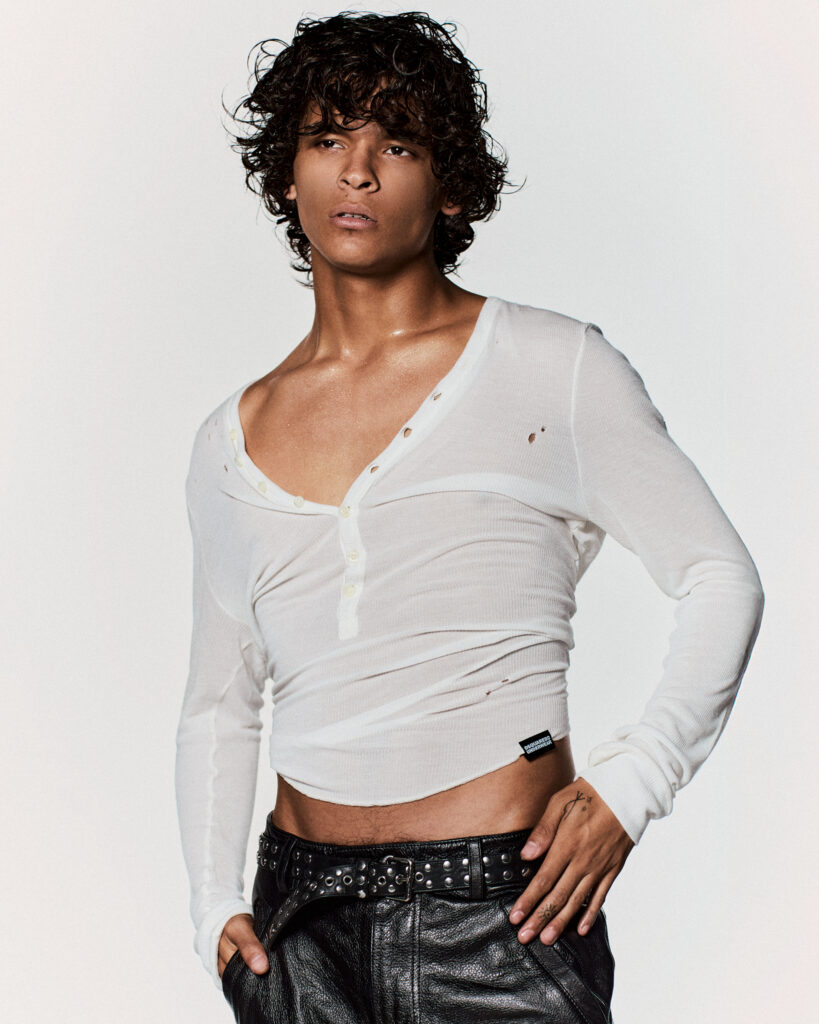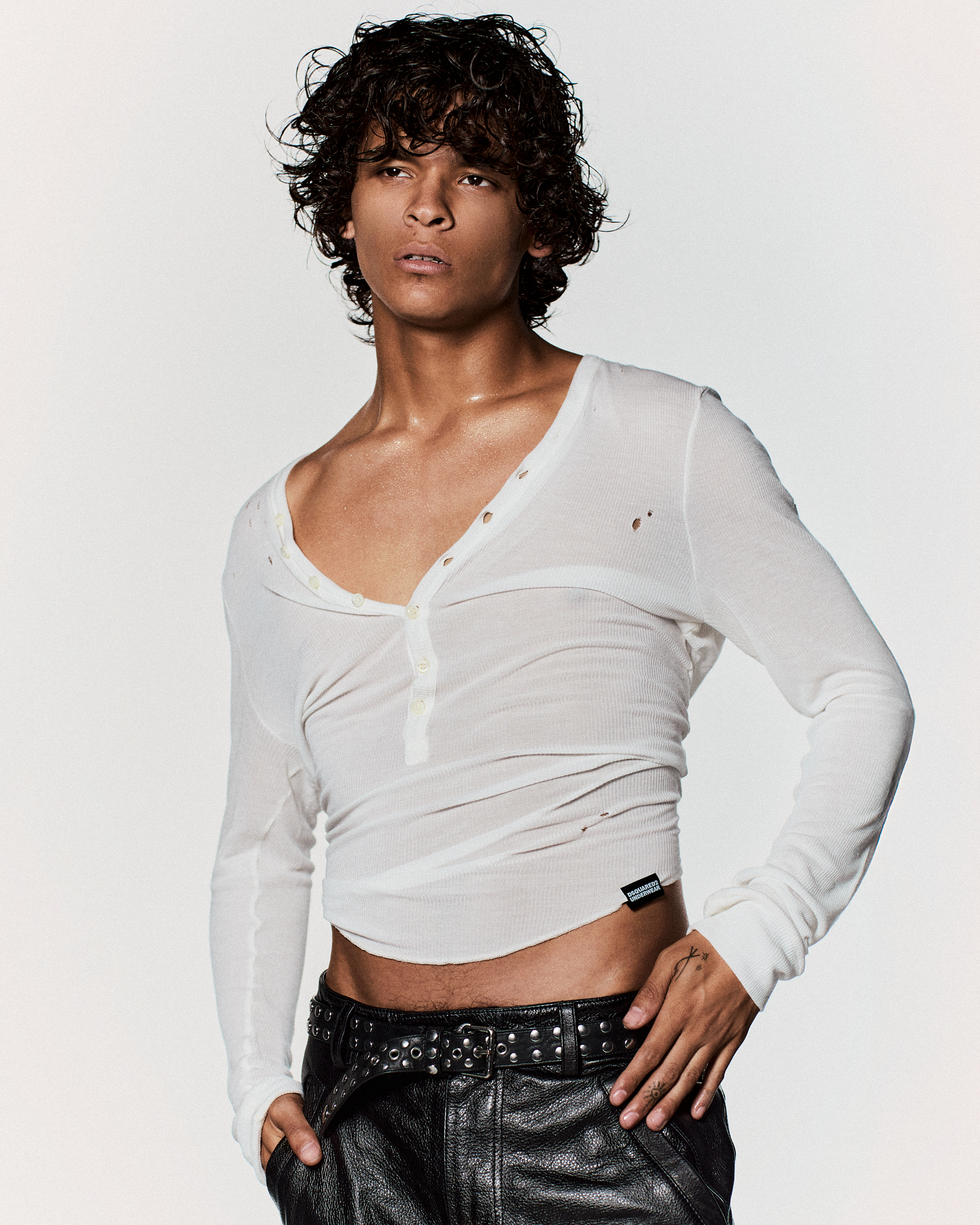D’Pharaoh Woon-A-Tai is magnetic. In an industry rife with people trying to say the exact right thing, he’s overflowing with unfiltered gratitudes and anecdotes. For much of his interview with VMAN, he has his camera off, but very endearingly turns it on at the end—revealing a head of disheveled hair spilling out of a hoodie—to bid farewell and earnestly thank me for the time. On set, he and I frequently interrupted the flow of the shoot by accidentally chatting about LA, skiing, the look he was excited to wear to the Louis Vuitton show, his partner Quannah Chasinghorse, everything and anything. The 23-year-old—best known for his critically-acclaimed role as Bear Smallhill in Reservation Dogs and this year’s Warfare—grew up in Toronto and admits that “just being a little troublemaker led me to acting.” In his youth, film and studying history were both forms of escape in equal part, and his first small role in a TV series called Holly Hobbie kicked off a years-long chase towards the feeling he encountered on set.
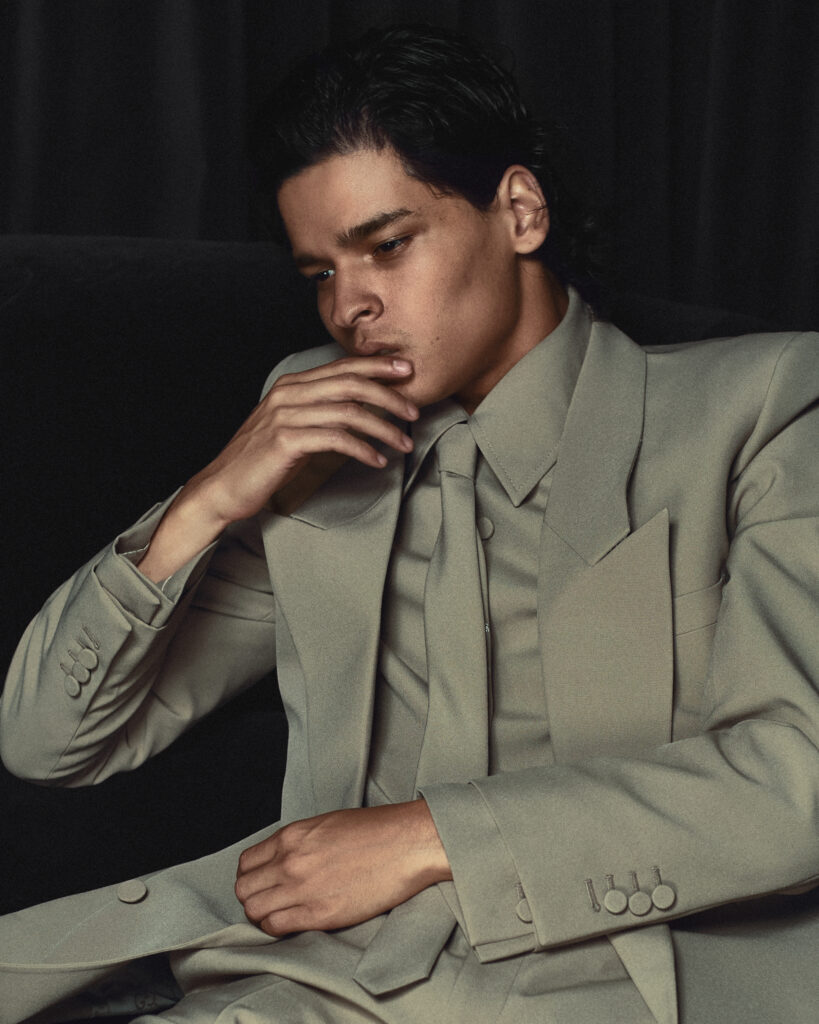
“I actually wanted to be a history teacher. I didn’t even know I wanted to be an actor until I fell in love with it, until I got an opportunity, ran with it and I fell in love with it,” says Woon-A-Tai, now based in LA, after growing up in Toronto feeling that he would be there forever. Film was an escape for a young Woon-A-Tai, who was simultaneously inhaling history books for the similar feeling they instilled. “That’s what I love about movies is being lost in them. When you feel like you know you’re in that world for a few hours, or you’re on this journey with these characters. And that’s so fulfilling, and that’s when it makes me feel like I’m just disappearing, getting away from a lot of the craziness that was in my life. And that’s kind of what history felt like, too. When I would be reading these history books, learning from them on my own time, it kind of had a sense of purpose.”
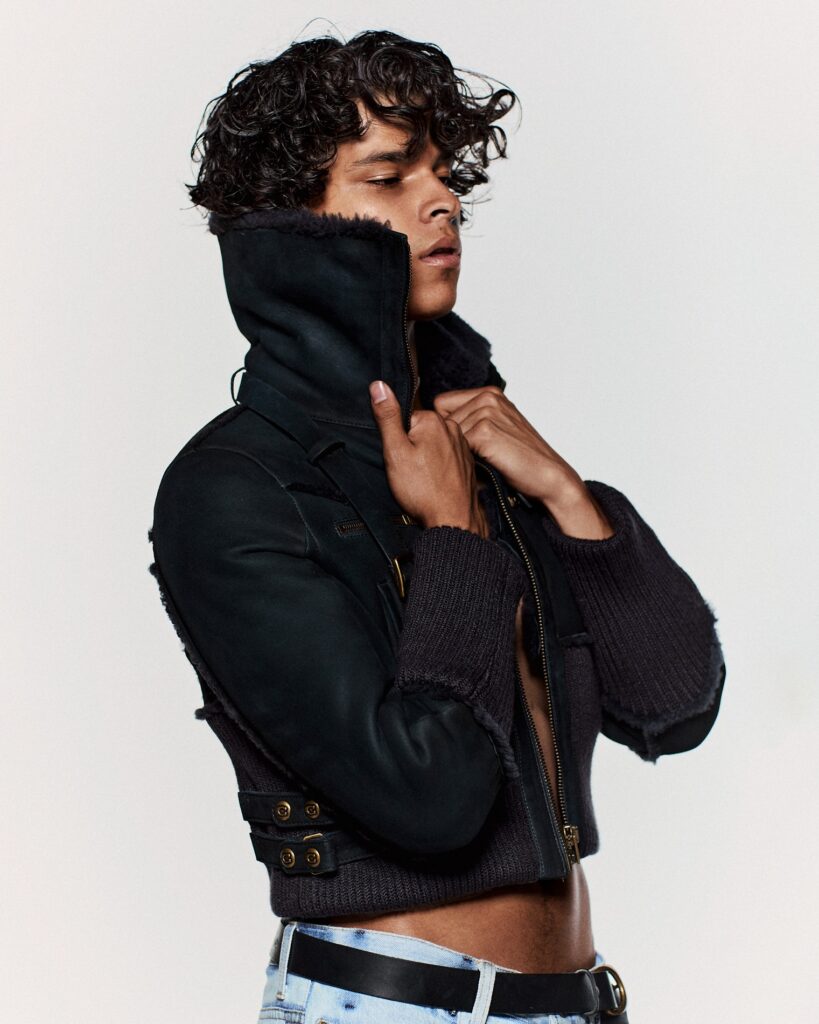
Woon-A-Tai’s first gig affirmed a new creative pursuit. “I was just a young little guy. You find the show and you see the episode, you see me in the background. I’m just 15 years old. I was literally a kid scared shitless,” he laughs to me. “Before working on set, I was doing a lot of nine-to-fives. I was working at McDonald’s. I was working at Native restaurants. I was working at movie theaters. I was clocking in and out, and I hated it. And I remember my first time I left the set after a 12-hour shift, and I come home, and I relaxed on my couch, and that was the first time it felt like I deserved to relax. It felt like I’ve actually done something with my life or my time where I deserve to relax. And that feeling that I got, honestly, felt like a high. I was on a high after being on set, and I’ve been chasing that high ever since.”
At 19, he was cast in Reservation Dogs, a show that altered much more than just Woon-A-Tai’s personal world. “Reservation Dogs changed everything for me. Both how I approached roles and auditions in general, but also how I approached native content,” he explains. The show—the first American TV series to feature exclusively Indigenous writers and directors—was a watershed moment for the industry more generally, “Basically, after that show, I realized that we could do this. We could be the directors, we could be the writers. We’ve proven to, not just ourselves, but to the Hollywood industry.”
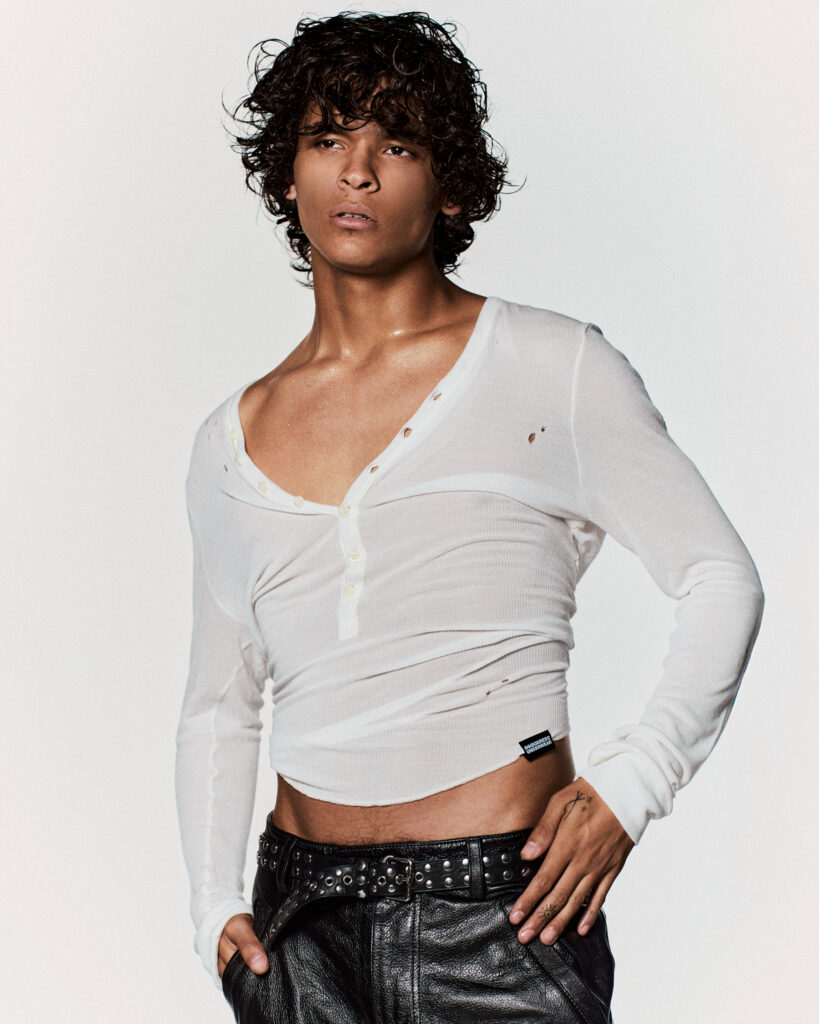
In the fall, Woon-A-Tai will appear alongside Austin Butler and Zoë Kravitz in Darren Aronofsky’s next feature, Caught Stealing. Coupled with Alex Garland’s recent film, Warfare, Woon-A-Tai walks in increasingly rarified air when it comes to his roster of collaborators. “Directors that I’ve got a chance to work with, like on Caught Stealing and Warfare, these are the directors and films that I’m talking about that brought me to those feelings of disappearing for a few hours.”
As we discuss Warfare, Woon-A-Tai again sheds any pretense of media formality, his words rich with tangible gratitude: “I can’t even tell you, man, it was a surreal moment. Like for real. The interview aside, man, that was a fucking surreal moment. I’m just a Toronto kid, who literally was at a crossroads from either making maybe not the best decisions in life, to trying out acting. And I just took the chance, and I still can’t believe that I fucking am here, man.”
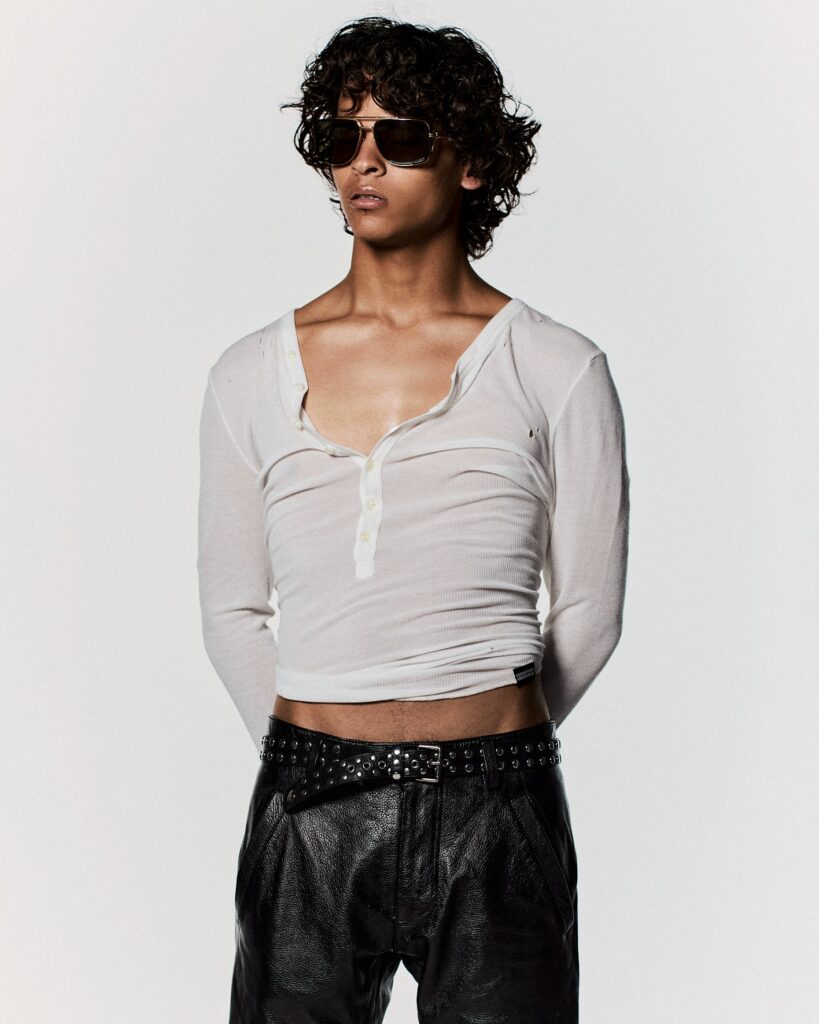
Woon-A-Tai portrays Ray Mendoza in Warfare, one of the co-directors and the basis of the story’s real-life narrative. “It was such an honor to play [him],” he says, explaining: “This is also probably one of the most traumatic experiences he’s ever experienced. And so to tackle that period in his life that was so important—and affected every single person there that day—I knew I had to take that role with care and responsibility. And you know, Ray Mendoza is half Native American. And we’re one of the leading members by ethnicity in the military—Native Americans. So there’s a lot of Native soldier, veteran stories out there that are not being told. And one step at a time, I’m hoping that a lot of these stories get out there.”
The relative serendipity that saw Woon-A-Tai fall into acting has evolved into a razor-sharp intention for the rest of his career. Warfare posed a unique opportunity to embody a strikingly different role from ever before. “That’s what my goal is in this industry, is I want to do everything different. I don’t want to be typecast for a certain type of role. I just want to do everything in between.” This personal focus is just one facet of Woon-A-Tai’s broader pursuit, best left in his own uninterrupted words:
“We’ve always been in the film industry, but never got to tell our own stories. Now we are getting to tell our own stories, and we made that happen for ourselves. I’m just excited that it’s going to be normalized. I’m excited for the fact that you’re going to have filmmakers who are just labeled as filmmakers, and not Native directors or Native filmmakers, and not Native actors and not Native writers. They’re just actors, they’re just writers, they’re just directors. And then we normalize who we are and how people perceive us. That’s what gives me goosebumps, and that’s what keeps me up. When I started off Reservation Dogs, the first thing I would hear a lot of time is, ‘What a moment it is for Native storytelling.’ And honestly, I disliked that phrase so much, because it implied that what’s happening right now is just a moment. It’s just brief. Next week is going to be something else that’s important. And I don’t think that it’s a moment for us. We finally shoved our foot in the door before it got closed, and we barged in, and we’re staying.”
This story appears in the pages of VMAN 55: now available for purchase!
Photography Isaac Anthony
Fashion Arut Arustamyan
Editor Charles Kolbrener
Grooming Peter Gray (Home Agency) using Oway USA
Location WSA Studio
Photo Assistants Isaac Schell, Anthony Lorelli
Fashion Assistants Abel Martirosyan, Erika Bennett, Adlet Bermukhamedov
Discover More
